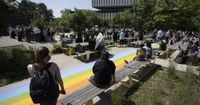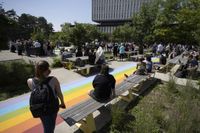A mass stabbing during a gender studies class at the University of Waterloo has culminated in legal proceedings resulting from the attack by Geovanny Villalba-Aleman, who has been sentenced to 11 years behind bars after the Ontario court found the act to be a particularly grave hate crime, rather than terrorism. Ontario Court Justice Frances Brennan ruled on March 17, 2025, declaring the primary motivation for the attacks was Villalba-Aleman's hatred toward the LGBTQ+ community, which became evidently clear as she presented details of the case.
The incident, which took place on June 28, 2023, saw Villalba-Aleman enter the classroom and ask about the subject being taught. After discovering it was a gender studies course, he pulled out two kitchen knives, measuring eight inches each, and attacked Professor Katy Fulfer as well as two other students. Thankfully, their injuries were non-life-threatening, but the psychological scars remain. Villalba-Aleman has been found guilty of two counts of aggravated assault, one count of assault with a weapon, and one count of assault causing bodily harm.
Justice Brennan stated during the sentencing process, "Mr. Villalba-Aleman planned this attack. He posted a boastful and hateful statement of his intention and committed the offense in a university classroom, no doubt to draw widespread attention to his crime. This was not an impulsive act by any definition. Mr. Villalba-Aleman was deliberate and calculated. He intended to inflict, and did inflict, widespread fear." This marked the judge's condemnation of the action driven by animosity toward the LGBTQ+ community as particularly significant.
Despite the evident hatred behind the attack, Justice Brennan clarified why the act did not meet the legal definition of terrorism. She noted, "The evidence does not prove beyond a reasonable doubt his hatred had crystallized to the level of ideology necessary to classify this crime as terrorism.” While he expressed remorse, as per court filings, the judge did not find sufficient evidence to classify the attacks as ideologically motivated terrorism.
The Ontario Crown initially sought 16 years of imprisonment, positing the assaults as terrorist activity. Conversely, provincial prosecutors requested 13 years under the premise of hate motivation. The defence team seemed to advocate for leniency, proposing eight years if terrorism were considered or five to six years if viewed through the prism of motivated hatred.
Victims of the assault, especially Professor Fulfer, have since been vocal about the attack's long-lasting repercussions. Following the incident, Fulfer received reconstructive surgery and has spoken of experiencing “a constant state of vigilance.” She conveyed her inner turmoil by stating, “While the physical pain has faded, my emotional scars remain.” Fulfer's commitment to creating inclusive spaces appears unwavering as she said, “Sentencing marks the end of the legal process, but our community work to cultivate spaces of belonging continues.”
Other victims also echoed the trauma experienced during the assault. One student, who has previously shared her traumatic experience of being stabbed, expressed how every day is filled with dread and fear, stating she relives the horror every time she sets foot inside educational environments. "I find it difficult to even set foot in school,” she remarked, highlighting how mundane activities have turned challenging.
Notably, Villalba-Aleman initially attempted to masquerade as one of the victims upon police arrival at the scene but later confessed to being the perpetrator. An agreement presented to the court revealed disturbing insights, including his belief post-secondary institutions enforced certain ideologies, contributing to his planned attack.
The days leading up to June 28 were evidently tumultuous for Villalba-Aleman. Background checks revealed he had arrived as an international student from Ecuador in 2018 but struggled with feelings of isolation and academic pressure. The court records also revealed police finding evidence of distasteful opinions contained within his manifesto, deemed filled with derogatory language aimed at various groups inclusive of feminists and LGBTQ+ activists.
Interestingly, his manifesto fell short of being identified as ideologically driven terrorism. Justice Brennan highlighted this by stating, “...his manifesto is as much a statement of a comprehensive worldview as a broken plate is to being a mosaic.” Despite his affirmative remarks of not being prejudiced against the LGBTQ+ community, the sheer vitriol of his rantings contradicted such assertions.
Villalba-Aleman, as reiterated by the judge, must serve at least half of the 11-year sentence before he is eligible for parole, having already served time. With the acknowledgment of the psychological and social impacts of his actions, he is also expected to be deported upon completing his sentence. The process has underscored debates surrounding hate crimes, mental health, and the educational environment, prompting discussions emphasizing safety and inclusivity.
The case’s outcome reinforces the broader societal conversations about the rising hostility toward marginalized communities and the significance of addressing the ideological undercurrents fueling such violent expressions. The repercussions of this grave assault will ripple not just through the lives of the direct victims but may also echo within the entire academic and local community, prompting reflections on collective responsibility and societal improvements.








